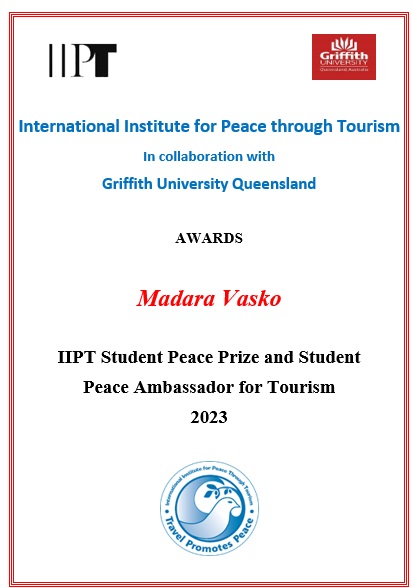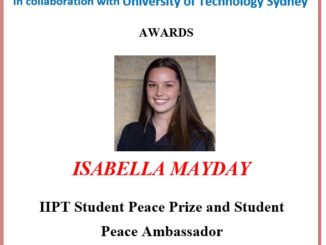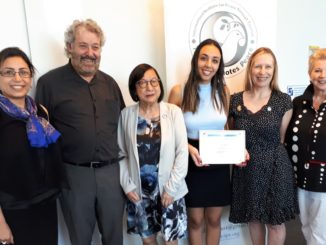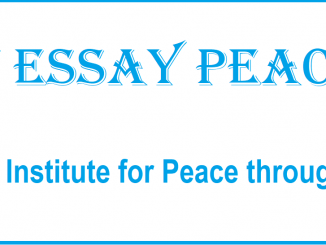The annual IIPT – International Institute for Peace through Tourism, Student Peace Prize 2023 has been awarded to Madara Vasko from Griffith University, Queensland Australia.
The award is presented each year by the Academic Lecturer at the collaborating University, short listing submitted essays from students, then evaluated by an invited Panel of Australian Tourism Industry Executives and IIPT Committee Members.

The essay topic this year: To what extent do tourists have a responsibility to build a sustainable and peaceful world through tourism? Discuss relevant actions that tourists could undertake when visiting a destination.

Madara Vasko submitted the following:
“Tourists, I beg you to consider peace in your destination selection”
Peace in terms of tourism focuses on what Higgins-Desbiolles et al. (2021) define as “positive peace”, which is the presence of a combination of desirable conditions in society, as opposed to “negative peace”, or the absence of war. Peace is also created through recognition of one’s own culture and the mutual respect produced to cultures visited and interacted with, producing a symbiotic relationship between tourism and peace. Whilst both are important to a synchronous tourism system, “positive peace” produces the effect of human happiness and fulfilment (Liebovitch et al., 2020), allowing for tourist destinations to possess greater income stability, security, and outlook on future, therefore thriving in both a community sense, and a commercial one that can be shared with tourists from around the world.
In this carefully balanced system possessive of “positive peace”, the tourist can choose to extend the positive impacts already present or hinder them through reckless behaviour or disrespect of local culture. Due to this important choice between respect and rebellion whilst travelling, and the fundamental reliance on tourists for income, the visitor plays a tremendous role in promoting peace through their holiday endeavours by contributing their hard-earned disposable income to allow for the employment of those in tourism destinations (da Silva et al., 2020).
Considering the importance of the collective power of tourists in the landscape of peace promotion in destinations visited, the tourist can and should choose to take individual actions to act as a catalyst to promotion of “positive peace”.
One such choice to promote “positive peace” involves travelling to, and supporting destinations that promote the concept and practice the principles of self-sustained peacebuilding. By “putting their money where their mouth is”, tourists can actively support these destinations that are working to establish the self-sufficient economic and social conditions needed for sustained “positive peace” (De Coning, 2018). Subsequently, through tourists’ economic support to the destinations that they deem to be promoting “positive peace”, the destinations relying on tourism for significant proportions of the area’s income are able to sustain themselves and act as examples to other destinations aiming to achieve the same. Therefore, through the monetary support example, tourists, if not necessarily individually, then collectively, are able to promote peace through tourism.
Another choice that can be made by tourists aiming to support peace-promoting tourism lies in participating in cultural and indigenous tourism experiences. Not only does this promote experiences that are life-changing for cultural understanding of both the indigenous communities worldwide and visitors themselves, but it also ensures that income generated by tourism activity is kept within the communities that tourists interact with. By doing so, the tourist is able to provide demand for the labour that supports the livelihood of peace-oriented communities, providing purchasing power, bridging gaps in wealth inequality between indigenous and non-indigenous communities, and exploring a different environmental outlook that is focused on conservation and environmental preservation (Bellato et al., 2022).
Therefore, by gearing travel intentions and purchases towards travelling to destinations practicing “positive peace” and supporting indigenous tourism experiences, the tourist has great potential, therefore responsibility to build a sustainable and peaceful global tourism system. This is done by “putting tourists’ money where their mouth is” and supporting tourism operators with missions that align with visitors’ morals for peace.
Let’s consider the alternative – supporting destinations that are not actively promoting the concept of peacebuilding. Destinations that allow corporations to exploit the residents of the communities that they disrupt, rummage and, eventually, run into the ground. Showing these kinds of destinations that you do not care about the rights, heritage, traditions, and livelihood of local and indigenous residents of destinations does not hold them accountable to practice business equitably and peacefully. Moreover, even if corporations operating within tourism destinations actively trying to build and/or maintain peace do obtain support of local residents, the financial leakages that these types of businesses create cannot be rightfully justified, unless corporations can show concrete evidence of support and contribution to the communities (not just the corporate type, where they claim funding to local communities, whilst really doing nothing but promoting themselves).
“So how can I as an individual contribute to building a more peaceful and sustainable tourism future?” you may ask…
When planning your next and subsequent trips, think about who’s hands your money is ending up in. Is your tourism provider in it for greed and profit, or are they trying to support their family and contribute to their own community? Is the destination you are travelling to implementing consistent and helpful action to preserve positive peace for their people and land? If not, then why do you feel it is ok to put your money there?
We would all appreciate living in the first scenario, and whilst the second might not seem too scary to those of us who haven’t experienced it, it is important to remember that the communities facing destruction from corporate greed are human just like the rest of us, and these people deserve “positive peace” in their families, communities, and cultures.
Bellato, L., Frantzeskaki, N., & Nygaard, C. A. (2023). Regenerative tourism: A conceptual framework leveraging theory and practice. Tourism Geographies, 25(4), 1026–1046. https://doi.org/10.1080/14616688.2022.2044376
da Silva, J. T., Breda, Z., & Carbone, F. (2020). Role and impact of tourism in peacebuilding and conflict transformation. IGI Global. https://doi.org/10.4018/978-1-7998-5053-3
De Coning, C. (2018). Adaptive peacebuilding. International Affairs, 94(2), 301–317. https://doi.org/10.1093/ia/iix251
Higgins-Desbiolles, F., Blanchard, L.-A., & Urbain, Y. (2022). Peace through tourism: Critical reflections on the intersections between peace, justice, sustainable development and tourism. Journal of Sustainable Tourism, 30(2-3), 335–351. https://doi.org/10.1080/09669582.2021.1952420
Liebovitch, L. S., Coleman, P. T., & Fisher, J. (2020). Approaches to understanding sustainable peace: Qualitative causal loop diagrams and quantitative mathematical models. American Behavioral Scientist, 64(2), 123–144. https://doi.org/10.1177/0002764219859618



